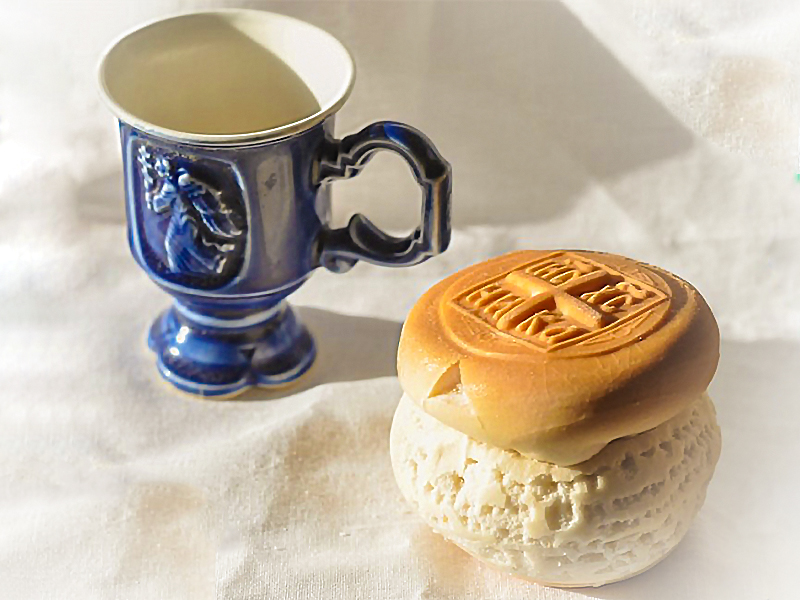Where does the consecration of water begin?
In addition to everything, the Creator created the water element and sanctified it, we read about this in the Bible: “and the Spirit of God hovered over the water” (Gen. 1: 2). But as a result of the fall of man, all nature was defiled.
Before the appearance of the Savior in the world, Saint John the Forerunner began to baptize people in the waters of the Jordan, and on condition of sincere repentance, a person was forgiven of his sins. And Jordanian water became a repository of spiritual impurity, but everything changed when the time for the Baptism of the Lord came. When Christ plunged into the river, He consecrated the whole watery nature. And since that time, water has again become the element of life.
In the Gospel, we repeatedly see that the Lord used water for healing. For example, when He saw the man born blind, and told him to wash, I was in the pool of Siloam. He went and washed and received his sight (John 9: 7). The pool of Bethesda is also remembered, into which an angel went and "disturbed" the water; the one who first entered the water after the “disturbance” recovered (John 5: 2-9).
Practical use
The first thing that is done with holy water is taken in the morning on an empty stomach along with prosphora, usually baptismal water, which is called the Great Agiasma. But you cannot give

up holy water because a person has already eaten; the liturgical charter speaks about this. It can also be taken in case of illness, sorrow and all kinds of infirmities.
You can wash yourself with consecrated water or wash your child, but you need to do this slowly with a prayer on your lips.
On the day of the Baptism of the Lord after the service, when the whole family gathers at home, when singing the troparion of the holiday, sprinkle the whole house, you can do this with sprigs of plants or a special
sprinkler, which can be bought in our
online store. You can also sprinkle an office, a car, etc. this certainly does not compare with the rite of consecration prescribed in the Trebnik, but this kind of sprinkling is blessed by the Church.
It is allowed to wash down medication with Agiasma, but it is extremely wrong to do this with the intention of enhancing medications.
The main thing in the use of consecrated water is discretion, therefore, of course, the questions of whether it is possible to cook food on it, give holy water to animals, or wash with it, do not have a place in the aspects of church piety.
Proper storage
The first thing to remember for people who are going to go to the blessing of water is not to take a very large container for this, just take a small vessel. And after the water runs out, dilute what is left with ordinary water, and all the water will become holy.
A vessel must be specially designed for water, it must always be clean, and must be kept in the red corner, and if it is not possible, then in another decent place.
Water consecration takes place in a special
church bowl with a built-in candlestick, such a container can be purchased in our
Axios store. The chalice of water will be the best gift for any ward.
Who can drink holy water?
All people can drink holy water, even those who are preparing for the sacrament of Baptism. For the latter, in our store you can buy everything for christening, from a
cross and a
baptismal shirt to
personalized icons, just choose in the product catalog.
There are also cases when a person receives a penance from a priest for serious sins and is temporarily excommunicated from Communion, then such a person, in order not to be left without a shrine, takes Epiphany water.
Women can also take hagiasma during a period of uncleanness, especially when one cannot receive communion, holy water will help to be a partaker of God's grace.
How many times should the water be blessed on the day of the Baptism of the Lord?
As you know, on Epiphany, water is consecrated twice on Epiphany Eve and the next day, but since the rite is the same, there is no difference between water.
It is known that this practice has been used in Palestine since the 6th century. Nowadays, this is even good, because many people come to the blessing of water, and so that there is not a large crowd, the priests advise half to come for water on Christmas Eve.
Of course, one should not take seriously the words about "Epiphany" and "Epiphany" water, that there must be a difference between them, this is all superstition, and has nothing to do with church canons.
Outcome
Consecrated water is an invaluable gift from the Lord. Since the Old Testament, water was the subject of both mercy and punishment, but with the coming of Christ into the world, the water element was illuminated. When performing a sacred act, the Creator gives His grace to ordinary water, and through it God sends to man healing, forgiveness of sins, and the communion of the Divine nature.

 up holy water because a person has already eaten; the liturgical charter speaks about this. It can also be taken in case of illness, sorrow and all kinds of infirmities.
up holy water because a person has already eaten; the liturgical charter speaks about this. It can also be taken in case of illness, sorrow and all kinds of infirmities.



